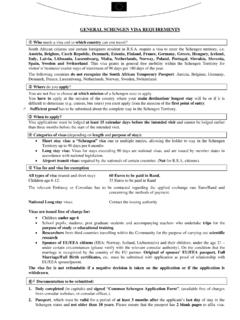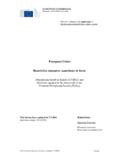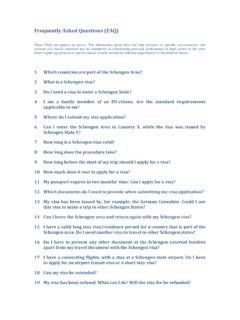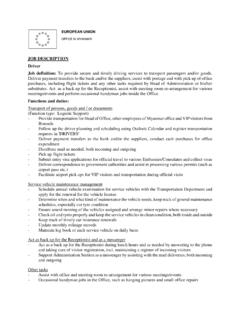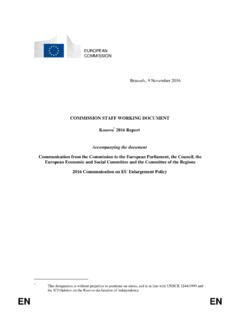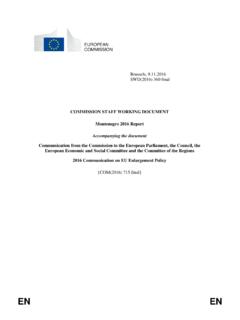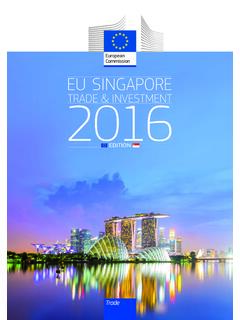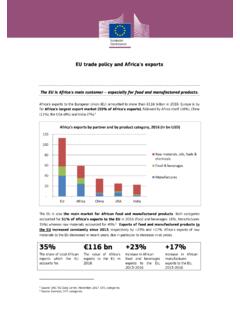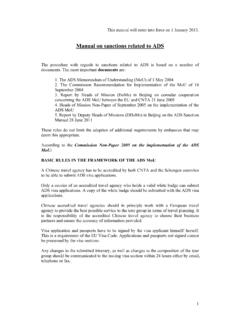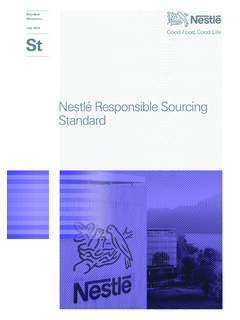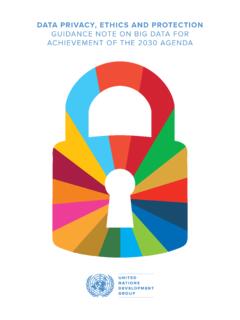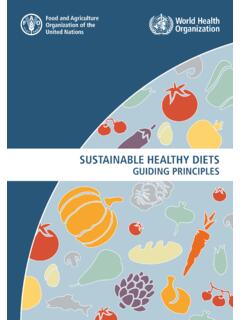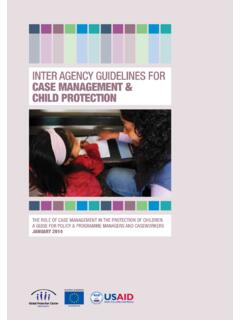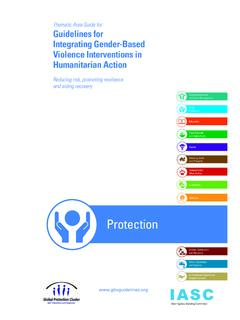Transcription of JOINT COMMUNICATION TO THE EUROPEAN PARLIAMENT …
1 EN EN EUROPEAN COMMISSION HIGH REPRESENTATIVE OF THE UNION FOR FOREIGN AFFAIRS AND SECURITY POLICY Brussels, JOIN(2021) 24 final JOINT COMMUNICATION TO THE EUROPEAN PARLIAMENT AND THE COUNCIL The EU strategy for cooperation in the Indo-Pacific 1 JOINT COMMUNICATION TO THE EUROPEAN PARLIAMENT AND THE COUNCIL THE EU STRATEGY FOR COOPERATION IN THE INDO-PACIFIC INTRODUCTION The Indo-Pacific a vast region spanning from the east coast of Africa to the Pacific Island States is increasingly strategically significant for Europe. The region s growing economic, demographic, and political weight makes it a key player in shaping the international order and in addressing global challenges. The EU intends to increase its engagement with the region to build partnerships that reinforce the rules-based international order, address global challenges, and lay the foundations for a rapid, just and sustainable economic recovery that creates long-term prosperity.
2 This engagement will be based on promoting democracy, the rule of law, human rights , and universally agreed commitments such as the 2030 Agenda and its Sustainable Development Goals, and the Paris Agreement on Climate Change. Building on EU Member States renewed commitment to the region in the Council Conclusions of 19 April 2021, this JOINT COMMUNICATION sets out the EU Strategy for Cooperation in the Indo-Pacific by: - Outlining the EU s rationale for strengthening its engagement in the Indo-Pacific; - Presenting the EU s principles guiding its engagement with the Indo-Pacific; - Setting out the EU s approach to partnership and cooperation in the region, and - Detailing how the EU will pursue this vision in cooperation with partners. 1. THE EU S RATIONALE: A STRONG BASIS FOR A MUTUALLY BENEFICIAL RELATIONSHIP The futures of the EU and the Indo-Pacific are inextricably linked given the interdependence of the economies and the common global challenges.
3 The region includes seven G20 members - Australia, China, India, Indonesia, Japan, the Republic of Korea and the Republic of South Africa - as well as the Association of Southeast Asian Nations (ASEAN), an increasingly important partner for the EU. The region is home to three-fifths of the world s population, produces 60% of global GDP, contributed two-thirds of pre-pandemic global economic growth and is at the forefront of the digital economy. The EU outermost regions and overseas countries and territories, constitutionally linked to its Member States1, are an important part of the EU s approach to the Indo-Pacific. The EU and the Indo-Pacific are natural partner regions in terms of trade and investment. The EU is the top investor, the leading provider of development cooperation, and one of the biggest trading partners in the Indo-Pacific region.
4 Together, the Indo-Pacific and Europe account for over 70% of the global trade in goods and services, and over 60% of foreign direct investment flows. Trade exchanges between the Indo-Pacific and Europe are higher than between any other geographical regions in the world, with annual trade reaching EUR trillion in 2019. The region is the second largest destination of EU exports and is home to 1 La R union, Mayotte; French Southern and Antarctic Territories, New Caledonia, Wallis-and-Futuna, French Polynesia 2 four of the EU s ten biggest trading partners. The region hosts major waterways that are of vital importance to EU trade, including the Malacca Straits, the South China Sea, and the Bab el-Mandeb Strait. The Indo-Pacific is both an important source of global environmental challenges as well as a potential beneficiary of their remedies.
5 The share of the region in global carbon dioxide emissions has grown from 37% to 57% since 2000 and the region will account for more than 70% of growth in global energy demand by 2030. Climate change is expected to further increase pressure on marine biodiversity, natural resources and fish stocks, leading to changes in ecosystem dynamics. The Indo-Pacific region includes a number of marine biodiversity hotspots, such as the Coral Triangle which accounts for 76% of the world s coral species and sustains 120 million people living in the area. The South China Sea alone accounts for around 12% of the global fish catch and hosts more than half of the world s fishing vessels. Therefore, the region is vital for mitigating climate change and protecting our planet s delicate ecological balance. In recent years, geopolitical dynamics in the Indo-Pacific have given rise to intense competition, including tensions around contested territories and maritime zones.
6 There has been a significant military build-up, including by China, with the Indo-Pacific s share of global military spending increasing from 20% of the world total in 2009 to 28% in 2019. The display of force and increasing tensions in regional hotspots such as in the South and East China Sea and in the Taiwan Strait may have a direct impact on EUROPEAN security and prosperity. There is also an increase in hybrid threats, including on cyber security. Democratic principles and human rights are also under threat from authoritarian regimes in the region, putting the region s stability at risk. Similarly, efforts to establish a global level playing-field based on transparent trade rules are increasingly undermined by unfair trade practices and economic coercion. These developments increase tensions in trade, supply and value chains. The COVID 19 pandemic has tested the resilience of economies, further exposed the interdependence of EU and Indo-Pacific partners, and highlighted that both gain resilience from open, diversified and undistorted access to world markets.
7 Finally, the ongoing crisis in Afghanistan also demonstrates the direct impact that events in the region have on Europe s security. In light of these factors, it is essential for the EU to reinforce cooperation with Indo-Pacific partners, including in bilateral, regional and multilateral contexts, and to promote the rules-based international order and access to open markets and ensure a stable trading environment. This will entail a further deepening and diversification of trade and investment ties and collaboration to help accelerate the green and digital transitions. This engagement should contribute to strengthening Europe s strategic reach and security and to securing the resilience of its supply chains. 2. THE EU S VISION: principles OF ENGAGEMENT WITH INDO-PACIFIC PARTNERS The EU s engagement with the Indo-Pacific region will be principled and long-term.
8 It will seek to: 3 Solidify and defend the rules-based international order, by promoting inclusive and effective multilateral cooperation based on shared values and principles , including a commitment to respecting democracy, human rights and the rule of law. Promote a level playing field and an open and fair environment for trade and investment. Contribute to achieving the Sustainable Development Goals (SDGs), to addressing climate change and environmental degradation on land and in the ocean, and to supporting sustainable and inclusive socio-economic development. Engage in bilateral and multilateral cooperation with partners to meet the objectives of the Paris Agreement on Climate Change and the Convention on Biological Diversity (CBD) Pursue its long-standing multilateral and regional cooperation with the United Nations and Bretton Woods Institutions, as well as regional organisations such as ASEAN and the African Union in the Western Indian Ocean.
9 Support truly inclusive policy-making and cooperation, where the voices of civil society, the private sector, social partners and other key stakeholders count. Establish mutually supportive trade and economic relations with the region that foster inclusive economic growth and stability, and promote and facilitate connectivity. Engage in the region as a partner in our efforts to raise awareness on the impact of global demographic trends. The EU will remain a consistent defender of human rights and democracy and continue to use all tools at its disposal: political and human rights dialogues and consultations, trade preferences and the mainstreaming of human rights considerations in all EU policies and programmes. The EU will continue to use its restrictive measures (sanctions) regime against individuals, entities and bodies responsible for, involved in, or associated with serious human rights violations and abuses worldwide.
10 In international fora, the EU will work with like-minded Indo-Pacific partners to push back any initiative that undermines the human rights enshrined in customary international law and in international human rights instruments. As a priority, the EU will continue supporting women s and girls full enjoyment of human rights and gender equality, empowering them for active involvement in civic and political decision-making, and working towards eliminating all forms of violence against them. The EU will also continue to support steps to combat all forms of discrimination2, the rights of ethnic and religious minorities, and to advocate the abolition of the death penalty that remains on the books in several Indo-Pacific countries. The EU will also promote decent work and respect of international labour standards of the ILO, with a view to eliminate child labour and forced labour in global supply chains.
